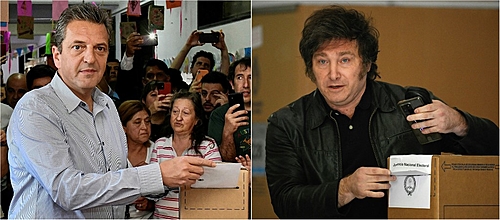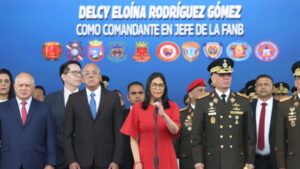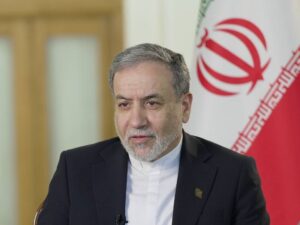
Sergio Massa, 51, and Javier Milei, 53, compete this Sunday (19) for the right to lead Argentina for the next four years. Whoever wins the election will occupy the Casa Rosada, the seat of government, from December 10, the day Alberto Fernández’s term ends. Find out who they are, where they came from, what the two candidates propose and what they said when voting.
Massa, who in the first round had received 36.7% of valid votes, against Milei’s 30%, said, when voting, that Argentina needs to enter a new phase, which requires, “in addition to good will, intelligence and capacity, dialogue and consensus necessary for our country to follow a much more virtuous path”.
The candidate, from the União pela Pátria coalition, is the representative of Peronism in the presidential race. In a country tumultuous due to a dramatic socioeconomic situation, a particularly aggressive electoral dispute and a growing disbelief in the political system, he presents himself as the candidate who will defend the workers and promote a government of national unity, which can calm tempers and find a way forward. way out of the crisis.
He is the current Minister of Economy, a position he has held for just over a year. With a conciliatory profile, he took over when the president decided to unify the portfolios of Economy, Productive Development and Agriculture, Livestock and Fisheries to centralize actions in the face of the worsening crisis. As some say, he is a kind of super minister or the de facto president, responsible for “holding down” the government and leading the renegotiation of the billion-dollar debt with the IMF (International Monetary Fund). He is a pragmatic politician, who dialogues well with powers, whether international (particularly the IMF) or internal powers in Argentina.
To help us understand who the government candidate is, journalist Mario Santucho, editor of the magazine Crisis, gives a brief history of how his political group was organized in recent years. The Frente de Todos, a Peronist coalition formed to face former president Mauricio Macri (2015-2019), was made up of three currents: Kirchnerism, massism and Albertism.
Kirchnerism, with current vice-president Cristina Kirchner at its head, would be, ideologically, the most left-wing current in the coalition. It includes Axel Kicillof, who is running for re-election as governor of the province of Buenos Aires and has a chance of being re-elected. Albertism, a reference to President Alberto Fernández, would be the center-left. And massism, a reference to Sergio Massa, would be the right of the coalition.
Massa took the lead in the coalition when he became Minister of Economy at a time of crisis, when the government was very crowded, with different guidelines that did not agree with each other, recalls Santucho. Supported by Kirchnerism, the majority faction of the coalition, he arranged for the most important sectors to be under his responsibility and then became a candidate — with Agustín Rossi, President Alberto Fernández’s chief of staff, as vice president. He was not Cristina Kirchner’s favorite candidate, but she thought it would be good to support him.
“The crisis is so acute that the government could not finish if Massa were not a candidate, which would be more disastrous”, assesses Santucho. “Massa’s greatest endorsement is his ability to manage and negotiate with the powers, but that was of no use. His management was even worse than the previous one.”
Santucho points out three positive aspects in Massa. One of them is the image of courage, of the politician who goes ahead, who “grabbed the hot potato when no one wanted to.” Another is the strong alliance with Kirchnerism, even though it is, in his view, an alliance of mutual convenience, without an ideological basis. And the third is the possibility that the candidate embodies a kind of political mutation for the better, something that “usually happens in Peronism”. An example, he says, is Néstor Kirchner, who was a traditional governor from the south of the country, and as president (2003-2007) “modified his trajectory and linked himself to the best of Argentine democratic traditions.”
“There are those who say that Massa is a similar figure, who could surprise with his desire for power, flexibility and pragmatism. But it could also be that, with so much pragmatism, he will put an end to Kirchnerism once and for all”, speculates the Argentine journalist.
Comings and goings
Massa, who began his political career on the liberal right, later switched to Peronism and became a strong ally of Cristina Kirchner, so much so that he became her chief of staff during the presidency (2007-2015). But, around 2013, he became a strong opponent of Kirchnerism, in a split that may have contributed to Macri’s victory six years later.
Mario Santucho, who breathes Argentine politics in his daily professional life, sees Sergio Massa as a center-right political figure in the Argentine ideological spectrum. He points out two arguments, among others: 1. he led a repressive management in terms of security as mayor of Tigre, a municipality neighboring Buenos Aires; 2. did not mobilize to defend the indigenous leader Milagro Sala, victim of “one of the clearest examples of lawfare (political and judicial persecution) against a social leader” — she is in prison, as she was convicted of illicit association, as leader of the organization social Tupac Amaru.
Massa’s past
Sergio Massa comes from a family of Italians who arrived in Argentina in the post-war period. At a certain point in his childhood, his paternal grandfather noticed his interest in politics and warned him not to follow that path. “Don’t get into politics, politics is dirty”, the grandfather would have said, according to the candidate’s recollection.
But it was in vain. Massa’s life was punctuated by politics from an early age. He says that, at age 11, he climbed on top of a bucket and imitated the authorities’ speeches that he saw on television. As a teenager, he began to join the Democratic Center Union party, on the liberal right. In 1994, he interrupted his law studies at the University of Belgrano, which he would only complete during the 2013 electoral campaign, and began a career in public administration. In 1999, he was elected provincial deputy at the age of 27. In the federal Legislature, he was deputy and president of the Chamber.
Mercy, ultraliberal is anti-establishment
Far-right candidate Javier Milei, from the A Liberdade Avança coalition, spoke of hope when it came to voting this Sunday. “Let’s hope that for tomorrow (20) there will be more hope, and not so much continuity and decay. That tonight we will have a new president elected,” he said. “We are very satisfied, despite the fear campaign and all the dirty campaign they carried out against us.
Milei was the big news of this election. With ultra-liberal and anti-establishment speech, he managed to change the configuration of forces on the country’s political board. If until then electoral disputes were restricted to Kirchnerists and Macrists, who concentrated more than 90% of the votes, what we saw this time was a battle of thirds, in which, during the first round, three political forces had a chance of passing to the second, each with about a third of the electorate.
In a country shaken by a deep socioeconomic crisis, Milei gained prominence with catchphrases and unconventional ideas, with the dollarization of the economy being the one that gained most prominence in the campaign — in this context, he even compared the weight to “excrement” and encouraged people exchanging pesos for dollars, which may have been one of the factors responsible for the exchange rate rush that made the dollar soar like never before and surpass the thousand-peso mark on the parallel exchange rate at the end of last week. Milei also proposes closing the Central Bank and privatizing state-owned companies.
Other controversial proposals that emerged during the campaign were the liberalization of the sale of firearms and even human organs, which Milei backed away from after the first round vote, in which he was seven percentage points behind Massa, in second place. From then on, she softened her speech in some aspects and formed an alliance with the conservative Patricia Bullrich, third place in the first round, and with former president Mauricio Macri (2015-2019).
An economist by training and deputy since 2021, Milei grew up through social networks, outside the media radar and the territorial network of traditional parties. “We never had a poster of Milei here. We didn’t see him arrive, he came in through the window,” said a leader from Villa 21-24, the largest popular neighborhood in Argentina, to The country. He received great support from the most vulnerable sectors, traditionally supportive of Peronism, but also from middle and upper class voters.
He often promised to cut public spending on a chainsaw, another of his catchphrases, in this case accompanied by an effect image, as he carried a chainsaw on his shoulder at campaign events — keeping the appropriate proportions, reminds the former President Jair Bolsonaro (2019-2022) making the gun in hand gesture, which became a hallmark of his campaign for the presidency of Brazil, in which he also had surprising growth, leveraged above all by his actions on social media.
Like Bolsonaro, Milei also tends to harshly criticize the political system, which he derogatorily calls “the caste”. “He calls himself anti-establishment, because he is an ultra-capitalist and believes that capitalism is corrupted by a corrupt establishment. He also questions businesspeople, who he calls “entrepreneurs” (a mix of businessman and dinosaur), in reference to those who live off greed, off income, without actually producing,” says Santucho.
Although he criticizes the political establishment, the candidate will have to dialogue and seek agreements with its members in order to govern, if elected. “Whatever his vote, he will not have a third of a parliamentary base in either House (Chamber and Senate), so his stability in office will depend on the alliances he makes with the caste”, says Argentine political scientist Andrés Malamud to Brazil in fact. Malamud explains that having a support base of at least a third of the Legislature works as a shield that serves to protect against, for example, an impeachment attempt.
Argentina’s past
The controversies surrounding Milei’s candidacy are not restricted to him and also touch on democracy and human rights, particularly sensitive topics in the country that had the most lethal dictatorship in South America — an estimated 30,000 deaths during the last phase dictatorship, from 1976 to 1983.
During the campaign, Milei’s running mate, lawyer and district parliamentarian Victoria Villarruel, spoke about the Argentine military dictatorship in a way that goes against the long process of reckoning with this authoritarian period that violated human rights. She stated that, if she reaches the government, she will promote a process of freeing the regime’s repressors who were condemned by the courts, and whom she considers to be “political prisoners”.
“The problem itself is democracy. In the sense that majority rules do not necessarily lead to something good”, said the candidate in an interview given in 2019. “For example, if a candidate proposes to kill everyone who opposes him and obtains 70% of the votes, that gives him Does it give the right to kill the other 30%? What I’m saying is that we don’t idealize democracy. Democracy, in itself, taken to its maximum, results in populism. Therefore, basically, we must work to build another functioning structure.”
The candidate’s past
During his adolescence, Javier Milei was a soccer goalkeeper and had a rock band that played Rolling Stones songs. He graduated in Economics from the University of Belgrano, in Argentina, and completed two master’s degrees in the area. He worked in consultancies, banks and economic policy groups. He defends a model of capitalism without state regulation.
Milei had problems with the press and received criticism for making misogynistic comments. Once, when commenting on the salary differences between men and women, she said that if women really earned less, companies would be full of them on their staff.
His campaign was coordinated by a woman, his sister Karina Milei, the only member of his family with whom he has contact, as Milei does not speak to his parents, as he considers them “toxic” people. In interviews, he reported having suffered many beatings and attributed this to the fact that he was “not afraid of anything”.
Editing: Rodrigo Durão Coelho
Source: www.brasildefato.com.br

